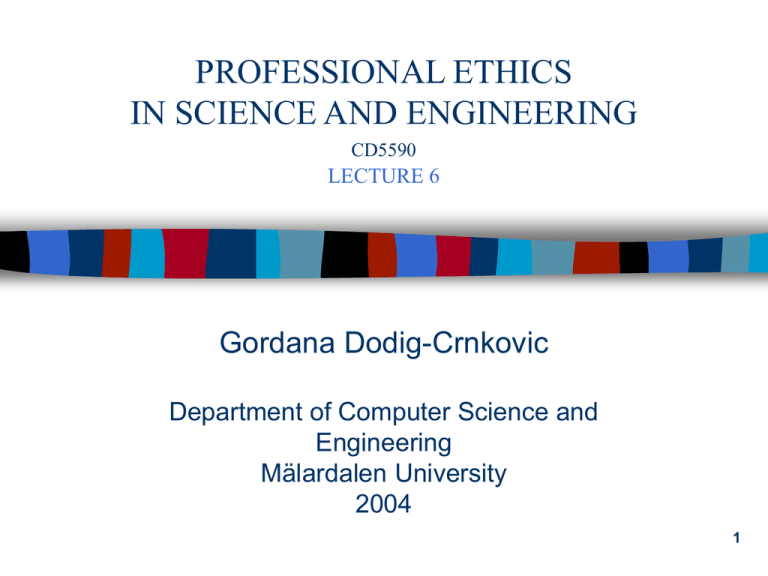Document
advertisement

PROFESSIONAL ETHICS IN SCIENCE AND ENGINEERING CD5590 LECTURE 6 Gordana Dodig-Crnkovic Department of Computer Science and Engineering Mälardalen University 2004 1 PROFESSIONAL AND ETHICAL RESPONSIBILITIES Codes of Ethics. Whistle Blowing CASE STUDIES (Stig) 2 Professional And Ethical Responsibilities 3 Ethics Ethical theory is the study of ethics at a conceptual level. Applied ethics is aimed at the everyday life of the typical person. Professional ethics is aimed at a person engaged in the practice of a particular profession. 4 Professional Ethics is about Relations between practicing professionals between employee and employer between professionals and their clients and on specialized technical details of the professions 5 The Core Ethical Issues The core ethical issues are as ancient and as simple as greed and dishonesty. 6 Ethics Contexts Industry (Other firms) Clients Consumers Profession (Societies) Engineering firm Family (Private Sphere) Engineer Colleagues Managers Global environment Society/Nature 7 Engineering as Social Experimentation “All products of technology present some potential dangers, and thus engineering is an inherently risky activity. In order to underscore this fact and help in exploring its ethical implications, we suggest that engineering should be viewed as an experimental process. It is not, of course, an experiment conducted solely in a laboratory under controlled conditions. Rather, it is an experiment on a social scale involving human subjects.” Ethics in Engineering, Martin, Schinzinger, McGraw-Hill, 1996 8 Why learn Professional Ethics? Ethics is a crucial part of the idea of professionalism! 9 Computing Curricula 2001, ACM/IEEE Social context of computing Methods and tools of analysis of ethical argument Professional and ethical responsibilities Risks and liabilities of safety-critical systems Intellectual property Privacy and civil liberties Social implications of the Internet Computer crime Philosophical foundations of ethics 10 Studying Codes of Ethics: The Goal Acquiring skill in practical ethical reasoning in a professional domain Developing the ethical autonomy, i.e. the ability and the habit to think rationally and critically about the ethical questions. 11 Studying Codes of Ethics: The Method Importance of professional knowledge and role-specific professional obligations in resolving professional ethical conflicts General principles necessary to comprehend and apply professional codes of ethics Case based reasoning with applying and interpreting codes 12 Association of Computer Machinery (ACM) Code of Conduct (1) 1. General Moral Imperatives 1.1 Contribute to society and human well-being 1.2 Avoid harm to others 1.3 Be honest and trustworthy 1.4 Be fair and take action not to discriminate 1.5 Honor property rights including copyrights and patents 1.6 Give proper credit for intellectual property 1.7 Respect the privacy of others 1.8 Honor Confidentiality http://onlineethics.org/codes/ACMcode.html 13 ACM Code of Conduct (2) 2. More Specific Professional Responsibilities 2.1 Strive to achieve the highest quality, effectiveness and dignity in both the process 2.2 Acquire and maintain professional competence 2.3 Know and respect existing laws pertaining to professional work 2.4 Accept and provide appropriate professional review 14 ACM Code of Conduct (3) 2.5 Give comprehensive and thorough evaluations of computer systems and their impacts, including analysis of possible risks 2.6 Honor contracts, agreements, and assigned responsibilities 2.7 Improve public understanding of computing and its consequences 2.8 Access computing and communication resources only when authorized to do so 15 ACM Code of Conduct (4) 3. Organizational Leadership Imperatives 3.1 Articulate social responsibilities of members of an organizational unit and encourage full acceptance of those responsibilities 3.2 Manage personnel and resources to design and build information systems that enhance the quality of working life 3.3 Acknowledge and support proper and authorized uses of an organization's computing and communications resources 16 ACM Code of Conduct (5) 3.4 Ensure that users and those who will be affected by a system have their needs clearly articulated during the assessment and design of requirements. Later the system must be validated to meet requirements 3.5 Articulate and support policies that protect the dignity of users and others affected by a computing system 3.6 Create opportunities for members of the organization to learn the principles and limitations of computer systems 17 ACM Code of Conduct (6) 4. Compliance with the Code 4.1 Uphold and promote the principles of this Code 4.2 Treat violations of this code as inconsistent with membership in the ACM 18 Whistle Blowing "Whistle Blowing" is when an employee tells on an employer who is breaking the law. Employees who blow the whistle on their employers are protected by law. If they are fired or otherwise retaliated against for whistle blowing, they can sue. 19 Whistle Blowing To actually "Whistle Blow", the employee must tell of the illegal act to someone outside the company. It must be a government or law enforcement agency. If the employee just complains to someone inside the company, that is not whistle blowing, and the employee is not protected by the whistleblower laws. However, the employee may be protected under other laws. For example, it is illegal to fire someone for complaining of sexual harassment or discrimination. 20 Whistle Blowing It is not necessary that the employer actually broke the law. The employee could be whistle blowing on something that isn't illegal in the first place. The employee is still protected from retaliation or termination. However, the employee must believe that he or she is reporting a violation of the law, and the employee's belief must be reasonable. 21 Whistle Blowing If the employee has reported the allegedly illegal activity to a government or law enforcement agency, he or she is protected. The employer cannot retaliate against the employee. The employer cannot fire the employee for the whistle blowing. The employer cannot mistreat the employee for whistle blowing. This does not mean that after whistle blowing, the employee cannot be fired for any reason. The employer can continue to treat the employee like any other employee. But the employer cannot treat the employee differently because of the whistle blowing. Obviously, if the employee whistle blows on Monday and is fired on Tuesday, it suggests that the employee was retaliated against for making the report. http://www.discriminationattorney.com/whistle.html 22 In-Class Activities: Planning General introduction, about half an hour. Introduction to the discussion (case studies) Discussions Summary 23 In-Class Activities: Case Studies You start presenting the case studies and asking a number of specific questions conected to it. Add general questions: - virtues duties justice social contract aspects conscience ethics egoism respect rights gender perspective if applicable utilitarian perspective You decide what way to include that into the discussion. 24





